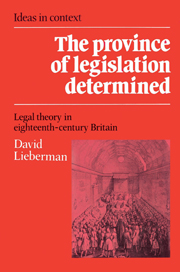Conclusion: The province of legislation determined
Published online by Cambridge University Press: 10 October 2009
Summary
Bentham concluded Of Laws in General with a brief survey of the “uses” of the work, in which he pointed to the more practical implications for law-making of the preceding analysis of “what a law is.” In particular he made plain that what he had now identified as a “complete body of laws” constructed “according to a method of division grounded on natural and universal principles,” could alone satisfy the requirements for a utilitarian system of legislation. Much of the argument turned on the interdependence Bentham established between an individual complete law and complete body of laws. In An Introduction to the Principles of Morals and Legislation he maintained that “the notion of a complete law must first be fixed before the legislator can in any case know what it is he has to do, or when his work is done.” He now insisted that “before any such specimen” of an individual complete law could “be found,” “a perfect plan of legislation must first have been produced.” Moreover, any individual law, “how complete soever in itself,” was “never completely adapted to its purpose … until it be completely put together.” And this was again dependent on “the idea of such a body” of complete laws having “been formed.” No particular piece of legislative policy could achieve its purpose unless it was formulated as a complete law, and this, in turn, required its being a part of a complete system of laws.
- Type
- Chapter
- Information
- The Province of Legislation DeterminedLegal Theory in Eighteenth-Century Britain, pp. 277 - 290Publisher: Cambridge University PressPrint publication year: 1989

